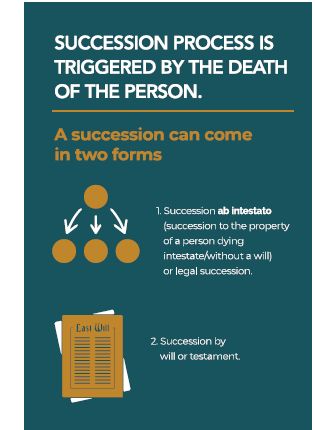We are living an unprecedented period with the unfortunate Covid-19 situation in the world. We must deal with circumstances going out of hands with little time to prepare and plan, and certainly most of us would have wished that we could have planned things sooner and perhaps differently. Predicting the future has become a real challenge. We never know when another crisis could hit us. Take for example clients who have established companies in Mauritius and hold their shares in their individual name. The vast majority of them tend to overlook the potential consequences in respect of their shareholding upon their unfortunate demise. In such cases it is wise to consider the fate of their shares with a view to ensuring that the process for the transmission of their shareholdings to their heirs is as seamless and straightforward as possible. This requires careful thoughts on succession related issues and the ways and means to address them.

Succession process is triggered by the death of the person. In a nutshell, it is the legal process by which heirs are designated (by law or will as the case may be) and the property composed of rights and obligations of the deceased is shared amongst them. A succession can come in two forms, namely (1) Succession ab intestato (succession to the property of a person dying intestate/without a will) or legal succession; and (2) Succession by will or testament. It is to be noted that if the succession is governed by Mauritian law, there are some mandatory provisions on the determination of the heirs and their share in the property of the deceased which cannot be excluded even by a will.
Under Mauritian laws, the law applicable to the succession is that of jurisdiction of the domicile of the deceased (Lex Domicilii) to be understood as the place of last domicile of the deceased (the country of permanent residence of the deceased) and should not be confused with the place where the death occurred. This being said local law rules may apply (i) for conservatory measures taken to protect assets during the succession process or (ii) in respect of the transfer formalities to be completed to give effect to the succession where the property is located in a different jurisdiction.
We will consider below with the scenario of a succession opened under a foreign law, out of which shares in a Mauritius company have to be transferred to the heirs.
Under the Companies Act 2001 of Mauritius ("CA 01"), a share in a company is considered as a movable property. At this stage, it is equally significant to consider the process under which a share in a company can legally be transmitted to the heirs, and the CA 01 provides that:
- The heir of a deceased shareholder may transfer a share even though the heir is not a shareholder at the time of transfer and such transfer of share will be valid as if he had been such a shareholder at the time of execution of the instrument of transfer; and
- Before entering a transfer as mentioned above, the directors of the company may require production of proper evidence of the title of the heir of the vesting order.
As such, it is important to identify the heirs of the deceased, and the succession process will depend on whether there is a will, or the person died intestate.
Where there is a will, the shares held by the deceased in a Mauritian company cannot be validly transferred to the heirs until a grant of probate has been obtained by the court of domicile of the deceased. A grant of probate is a legal document which confirms that the executor (the person authorized to deal with the deceased's property) has the authority to deal with the deceased person's assets and he will be administering these assets in accordance to the will. Once this is granted, in addition to a copy of the will being provided to the company, a legal opinion from a lawyer in that country will be required to:
- Advise on the grant;
- To provide confirmation and verification of the laws of inheritance at the date of the death of the person;
- Confirm who are the executors and heirs of the deceased under the terms of his will;
- To give further confirmation of the residence and domicile of the person at the date of his death.
Upon receipt of all the above, the secretary company in Mauritius will be able to do the needful, including advising the Registrar of Companies, for the transfer of the shares to the heirs.
Where there is a no will, the shares cannot be validly transferred to his heirs until the requisite procedures are undertaken in the law of domicile to designate the heirs and tackle the other issues related to the of succession ab intestato such as the sharing of property amongst the heirs. In some countries, provisions exist for the grant of letters of administration or affidavit of succession. Once these procedures are completed, provided there is a legal/court document confirming the heirs of the deceased, accompanied by a legal opinion by a lawyer of the country, the company will be able to do the requisite to transfer the shares to the heirs including advising the Registrar of Companies.
In both scenarios, the process of succession may be lengthy, costly and complicated and becomes a real burden on the heirs. This is where the MAST, as introduced by AXIS, comes as an effective solution. The MAST is a Trust established under the laws of Mauritius (the Trust Act 2001) and is a Trust which is specifically set-up to hold the shares of the company for the benefit of the individual and his heirs/family. MAST, which is very easy, quick and cheap to set up and maintain, will effectively become the shareholder of the company and its most interesting aspect is that it can give the complete freedom to the settlor (the former shareholder) to deal with the shares as if he was a shareholder in his own name.
MAST will also cater for the names of beneficiaries (the shareholder can appoint his heirs) and in the event of demise, there is no impact on the structure, as the MAST will remain the shareholder of company for the benefit of the beneficiaries. Thus, the succession issue is successfully tackled without any burdens (as mentioned above) on the heirs and it avoids the cumbersome legalization, registration and cross-border enforcement formalities associated with either a foreign will or in a case there is no will. In the same way as MAST may be used to hold shares in Mauritius Companies, it may also be used to hold business interest in companies worldwide outside of the domicile of the client.
Covid-19 has taught us lessons that things can change dramatically without the least expectation. Just like the struggle in the fight against this pandemic, it is imperative to plan ahead for the protection of your business. A MAST can certainly become your mask of protection and help you protect your companies by having an effective succession planning without undue burden on your heirs.
Originally published by African Family Business Enterprise Magazine.
The content of this article is intended to provide a general guide to the subject matter. Specialist advice should be sought about your specific circumstances.

